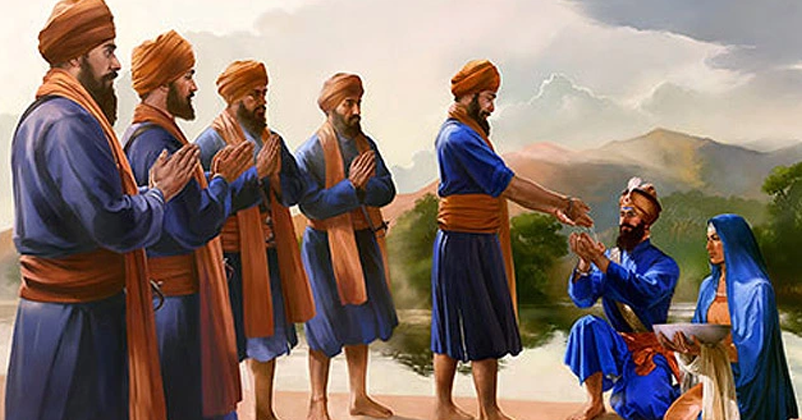13 April,1699: When Guru Gobind Singh Ji established Khalsa Panth with Panj Pyare
Total Views |

The Khalsa Panth Foundation was established on 13 April 1699 by Guru Gobind Singh, the tenth Sikh Guru. The foundation marked a significant moment in Sikh history, as Guru Gobind Singh initiated the first group of Sikhs into the Khalsa, a community of initiated Sikhs who are committed to upholding the values of Sikhism.
The background leading up to the establishment of the Khalsa Panth Foundation is rooted in a period of intense persecution and oppression faced by the Sikh community under the Mughal rulers of India. Guru Gobind Singh, the tenth Sikh Guru, sought to instill a sense of courage, unity, and resilience among his followers in the face of adversity.
On the day of Vaisakhi in 1699, Guru Gobind Singh gathered thousands of Sikhs at Anandpur Sahib in Punjab, India. In a symbolic gesture, he drew his sword and called for a volunteer willing to sacrifice their life for their faith. The atmosphere was charged with anticipation and devotion as the Guru repeated his call three times. On the third call, a courageous soul named Bhai Daya Ram stepped forward, offering himself to the Guru.
Guru Gobind Singh led him into a tent and emerged with his sword seemingly dripping with blood. He then called for four more volunteers, each of whom demonstrated unwavering faith and commitment.
Following Bhai Daya Ram, four more devout Sikhs - Bhai Dharam Singh, Bhai Himmat Singh, Bhai Mohkam Singh, and Bhai Sahib Singh - were baptized into the Khalsa fold by Guru Gobind Singh Ji.
These five individuals, known as the Panj Pyare (the Five Beloved Ones), were initiated into the Khalsa through a special ceremony known as Amrit Sanskar. Guru Gobind Singh prepared Amrit, a sweetened nectar, in an iron vessel using a double-edged sword. The Panj Pyare partook of this Amrit, symbolizing their rebirth as Khalsa warriors dedicated to righteousness, equality, and service to humanity.
Guru Gobind Singh then received Amrit from the Panj Pyare, emphasizing the principle of equality and mutual respect within the Khalsa community. He declared that all initiated Sikhs would adopt the name Singh (for men) or Kaur (for women) to signify their membership in the Khalsa brotherhood.
With the creation of the Khalsa Panth, Guru Gobind Singh Ji transformed the Sikh community into a formidable force committed to defending the oppressed, upholding justice, and preserving the teachings of Sikhism. The Khalsa became the vanguard of righteousness, embodying the virtues of humility, compassion, and selfless service.

